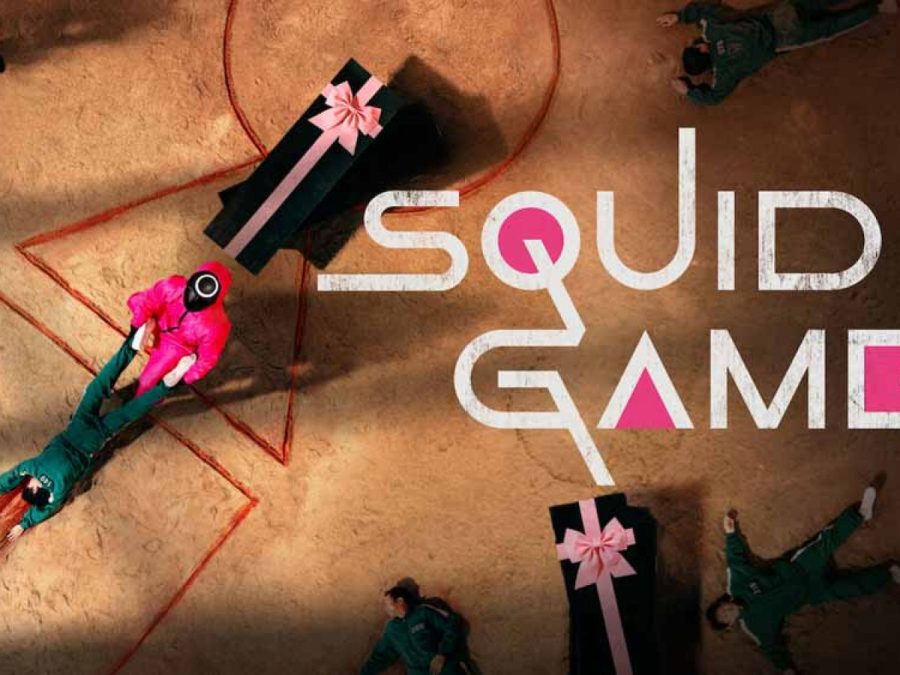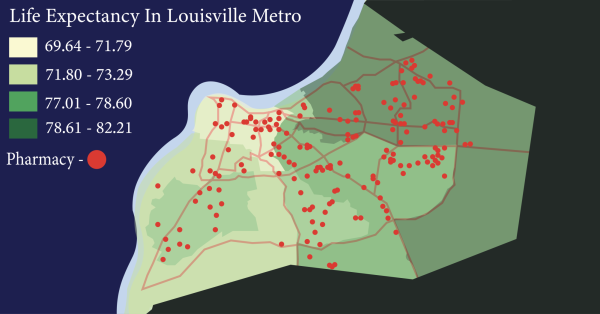REVIEW: Squid Game is anticapitalist — and much more
Workers carry away the bodies from the latest round of the squid games.
November 10, 2021
You are drowning. The debt, the expectations, the pain, is all too much. You were given one more opportunity, but, like all the others, it turned out to be a trap. You thought it was simple- play some games, and if you win, you get enough money to live a comfortable life and stop worrying about the ruin on your heels. It turns out that if you lose any of the games, even once, you will die. You stay anyways. You have no other options. Outside the rooms with blood smeared onto children’s art, nothing waits for you but a return to the pit of poverty and pain. Welcome to Squid Game.
Spoiler warnings for anyone venturing past this point without having watched the show.
Squid Game has become fairly popular since it released on Netflix. This show that the creator, Hwang Dong-hyuk, scripted in 2008, did not find anyone willing to produce it until Netflix picked up the idea a decade later. It was inspired by the creator’s own experiences with poverty in South Korea, but clearly resonated with foreign audiences as well. That’s because, at its heart, the show is deeply concerned with capitalism, an economic system that governs the lives of people around the world,as well as, arguably, deeper messages about human nature.
Some of the analogies to capitalism in Squid Game are very surface level and obvious. Obviously our protagonists are (mostly) all motivated by extreme, inescapable debt. This, in turn, showcases how severe debt in the real world is a pitfall that requires exceptional luck and perseverance to escape- and most still never do. This is reflected by the fact that our final winner, Seong Gi-Hun, was not the smartest or strongest player. He allied with people that were weak out of compassion and barely survived every game he played in, often due to other people’s help- in red light green light, Ali saves his life. 001, or Oh Yeong-Su, lets himself be eliminated so Seong can move on. Even at the last hurdle, Seong tries to give up his victory, and only wins when Sang-woo kills himself.
But on a bit of a deeper level, we begin to examine what Squid Game says about capitalism. Seong’s victory is bittersweet- his old friend Sang-woo kills himself when he sees that Seong would rather give up the money at the very end than kill him, even after he witnesses Sang-woo murder two people right in front of him. Sang-woo was arguably one of the most calculating players, picking strong allies, disdaining weak ones, managing to guess the honeycomb game objective before it started, and willing to kill to secure his victory.
What does that tell us? It tells us that, in Squid Game’s eyes, capitalism does not care about your efforts or your sacrifices. You will be used for a desired purpose, and when that usefulness runs out, they will discard you- in this case, as soon as you are no longer entertaining.
There’s also something to be said in how the games are framed to the participants, both before and after it becomes clear that people are going to die en masse. The exact wording used in the english dub for what happens when a player loses is “eliminated”. This reeks of corporate euphemism used to mask the severity, the impact of a company’s actions. Even after the contestants are left with no doubt that losing means death, the announcers on the PA and the workers in pink all still refer to it as elimination.
There’s also an interesting moment after the first game where the crowd confronts the workers, who are now conspicuously armed. When accused of murdering more than half of the contestants, the square-masked manager responds, very deadpan, that they do not want to hurt any of the contestants, and that they are offering them one final chance to escape their circumstances. Then, they drop all the money added to the prize pool by the death of over 200 contestants in the first game into a gold tinted piggy bank hanging from the ceiling.
This scene, to me, is an embodiment of another poisonous aspect of our corporate-dominated world. The organizers of the games fully plan to kill nearly everyone here, but even in this moment, they justify their actions with claims that they do this for the betterment of the people they’re killing. The money falling into the piggy bank high above their heads is representative of corporate enticement, that suggestion that maybe, if you work hard enough, one day you’ll be a manager, be someone important at the table making decisions for the entire company. In practice, that almost never happens. Due to the nature of managers and workers, not everyone can be a manager in a society that requires human workers. It’s a trap, designed to keep people within an exploitative system so that the company can get every little bit of usefulness out of them before they are abandoned.
There’s statements about capitalistic society throughout Squid Game, and I couldn’t hope to address all of them here. But there is one more that I’d like to examine before shifting tone. That would be Hwang Jun-ho, or as many may know him, the detective.
Hwang is the only protagonist not taking part in the games. He is a Korean police detective who managed to track down the Squid Game location by following the vans that picked up the contestants. We watch as he infiltrates the island, gathering as much information as he can and having several close brushes with death. He manages to find documents listing player rosters and interrogate one of the VIPs, people we are led to believe are benefactors for the Squid Games, and escapes the game complex. He reaches a nearby deserted island, and tries to send evidence back to his department, but we never see if it went through, as the cell signal is very weak on most deserted islands. He confronts the Frontman on a cliff, is shot in the arm, and falls over the edge.
So why do I point him out? Well, Hwang is representative, to me, of the idea of a good person in a place of authority. That distinction matters because we don’t get a lot of those in Squid Game. The rest are VIPs, faceless goons, the main death game organizer, and the Frontman, who turns out to be Hwang’s own missing brother.
This is important because it addresses a counter argument many people might use against this criticism of capitalism: that the people in power really have our best interests at heart. Hwang is one of the most morally just characters in the show to me- he puts his life at risk to find his brother and help strangers, and the only people he kills are two employees that were harvesting organs from dead players on top of being complicit in a mass murder disguised as children’s games. But in the end, he fails. Even if his evidence got through, it doesn’t change anything. In the final episode’s flash forward, we see the next year’s Squid Games getting ready to start, as the games send out their signature cards once more.
What we see here is a statement: Yes, there are good people in places of power, but they are overpowered by the bad. Due to the nature of corporations, they are also likely to be working from a disadvantage, because they lack the callousness to maximize efficiency at the expense of morality and the people who trusted them. And in the end, Hwang finds that his own brother was complicit in the games. He trusted someone fully. In corporate terms, that can be a death sentence. And in the end, his sacrifice didn’t matter, because he didn’t have the resources to beat the capitalistic system on his own.
And there’s one more aspect of the games that make them all the more terrible. The infighting. You see, Squid Game is not only a criticism of the rich. It is a criticism of the entire capitalistic system, and by extension, perhaps even human nature. By creating a situation where not everyone will succeed, rewards scale on the number of deaths, and murdering opponents is allowed, the contestants quickly begin to turn on each other. As the player count is whittled down, alliances fail, and friends become rivals, The contestants begin to turn on one another for personal gain and increased prospects of their own survival. This is a condemnation of not only the rich people in capitalism, but the way we, normal citizens, respond to the system. In reality, far more players would get out of Squid Game alive if the players had all worked together, but the desire for personal wealth and fear of other people taking advantage drives them to turn on each other. This is a criticism of the willingness of humans to betray each other for personal benefit, and also a good case study in how people can be manipulated into fighting each other instead of the actual cause of their problems. It’s a basic political move- placing blame on someone else to divert anger and cause infighting that draws attention away from you.
So with all this in mind, what is Squid Game’s point? Why illustrate this tragic story with next to no survivors and no guarantee that there was even a purpose to the suffering? There’s one answer that calls out to me. Perhaps Squid Game’s point is not necessarily that the Squid Games are directly analogous to real life. Most people do not actually have a gun pointed at their head if they disagree with the system. Most people in the real world aren’t willing to actually kill each other for that promotion. Companies usually don’t shoot people in the head when they’re fired. Perhaps the point is more metaphorical.
Perhaps the point is not that the Squid Games (or something like them) are real- though that is a technical possibility. Perhaps the point is that we are too close to the point where they could be. When Hwang Dong-hyuk first pitched the story, it was taken as too dark, and nobody wanted to make the script into reality. Now, the concept of Squid Game hits close enough to home that audiences can empathize with it. Since the show came out, I’ve heard several people state that they thought something like the Squid Games must be real, and about as many say that they’d participate in them if they were. Perhaps we are meant to look at the mindset of not only the faceless conglomerates in charge of the world, but into ourselves, and ask where we draw the line between success and morality.
Featured Image is used under Fair Use for the purposes of review.


















